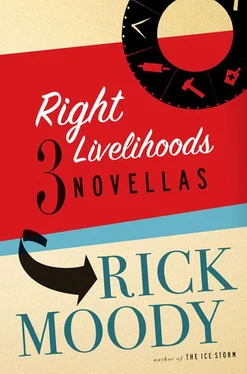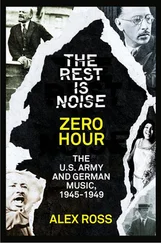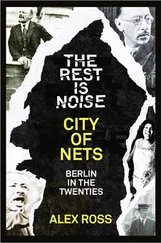“What do you know about the origins of Albertine?”
“What do you want to know?”
“Are you high now?”
Which was like asking if she’d ever seen rain.
“Are you high enough to see the origins from where you are sitting?”
“I’d have to be there to have a memory of it.”
“What have you heard?” I asked.
“Everybody’s heard something. ”
“I haven’t.”
“You aren’t listening. Everybody knows.”
“Then tell me,” I said.
“You have to be inside. Take the drug, then you’ll be inside.”
Up at the corner, a blue-and-white sedan — NYPD — as rare as a white tiger in this neighborhood. The police were advance men for the drug cartels. They had no peacetime responsibility, except they made sure that the trade proceeded without any interference. For this New York’s Finest got a cut, a portion of which they tithed back to the city. So the syndicate was subsidizing the City of New York, the way I saw it. Subsidizing the rebuilding, subsidizing the government, so that government would have buildings, underground bunkers, treatment centers, whole departments devoted to Albertine, to her care and protection.
Fox, a small-time dealer and friend of Bob, one of my sources, was the first person I could find who’d float these conspiratorial theories. Right before he disappeared. And he wasn’t the only one who disappeared among the people I came to know. Bob stopped returning my calls too. Not that it amounted to much, a disappearance here and there. Our city was outside of history now, beyond surveillance. People disappeared.
“I don’t, like, buy the conspiracy angle,” I said to Cassandra. “Been there, done that.”
Her eyes fluttered, as if she were fighting off an invasion of butterflies.
“Well, actually. .,” she said.
“Government isn’t competent enough for conspiracy. Government is a bunch of guys in a subbasement somewhere in Englewood, waiting for some war to blow over. Guys hoping they won’t have to see what everyone out on the street has seen.”
I helped her from the swing. She was thin, like a greyhound, and just as distracted. The chains on the swing clattered as she dismounted.
It wasn’t that hard to be at the center of the Albertine story, see, because there was no center. Everywhere, people were either selling the drug or using the drug, and if they were using the drug, they were in its thrall, which was the thrall of memory. You could see them lying around everywhere. In all public places. Albertine expanded to fill any container. If you thought she was confined to Red Hook, it seemed for a while that she was only in Red Hook. But then if you looked in Astoria, she was in Astoria too. As if it were the act of observing that somehow turned her up. More you looked, more you saw. A city whose citizens, when outdoors, seemed preoccupied or vacant. If inside, almost paralytic. I couldn’t tell you how many times in that first week of reporting I happened to gaze into a ground-floor window and see people staring at television screens that were turned off .
So I went on with the theories:
“People think the government has the juice to launch conspiracies. But if they were competent enough for that kind of subterfuge, then they’d be competent enough to track some guy who brings a suitcase detonator into the country across the Canadian border and has the uranium delivered to him by messenger. Some messenger on a bike! They’d be competent enough to prevent a third of Manhattan getting blown up! Or they’d be able to infiltrate the cartels. Or they’d be able to repair all of this civic destruction. So are we going to kiss now?”
“Later,” she said.
I was thinking that maybe this conversation had come to an end, that there was no important subtext to the conversation, that Cassandra was just another deep-fried intelligence locked away in the past, and that maybe I should have gone on my way to pay off the epidemiologist who had the new angle. But then she was sneaking me a little bit of insider information; she said, “Brookhaven.”
Meaning what? Meaning the laboratory?
Of course, the Brookhaven theory, like the MIT theory, like the Palo Alto Research Center theory or the Jet Propulsion Lab theory. These rumors about Albertine just weren’t all that compelling, because everyone had heard them, but for some reason I had this uncanny sense of recognition at the name of the government facility on Long Island. Then she said that we should together go see the man.
“I don’t know exactly about the beginning, the origin,” Cassandra said, “but I’ve been with someone who does. He’ll be there. Where we’re going.”
“What are you seeing right now?”
“Autumn,” she whispered.
It was a coming-down thing. The imagery of Albertine began to move toward the ephemeral, the passing away, leaves mulching, pumpkin seeds, first frost. Was there some neurotransmitter designated as the seat of memory that necessarily had autumn written into it? A chromosome that contained a sensitivity to fall? When I was a kid there were a couple years we lived in northern California, a charmed place, you know, during the tech boom. Those words seem quaint. Like saying whore with a heart of gold. I couldn’t forget northern California, couldn’t forget the redwoods, the seals, the rugged beaches, the austere Pacific, and when I heard the words tech boom, I knew what memory I would have if I took the drug, which was the memory of the first autumn that I didn’t get to see the seasons change. In northern California, watching the mist creep into the bay, watching the Golden Gate engulfed, watching that city disappear. In northern California, I waited till evening, then I’d go over to the used-book stores in town, because there was always someone in the used-book stores who was from Back East. So this would be my memory, a memory of reading, of stealing time from time itself, of years passing while I was reading, hanging out in a patched armchair in a used-book store in northern California and, later on, back in Mass. Maybe I was remembering this memory or maybe I was constructing it.
We were going over the bridge, the Kosciusko, where there was only foot traffic these days. Down Metropolitan Ave., from Queens to Brooklyn, over by where the tanks used to be. Not far from the cemetery. You know what you might have seen there, right? Used to be the skyline; you used to see it there every day, caught in traffic, listening to the all-news format. Maybe you got bored of the skyline rising above you, maybe it was like a movie backdrop, there it was again; you’d seen it so many times that it meant nothing, skyscrapers like teeth on the insipid grin of enterprise, cemetery and skyscrapers, nice combination. The greatest city in the world? Once my city was the greatest, but this was not the view anymore, on the night that I walked across the bridge with Cassandra. No more view, right? Because there were the debris clouds, and there was the caustic rain that fell on all the neighborhoods, a rain that made everybody sick afterward, a rain that made people choke and puke. People wore gas masks on the Kosciusko. Gas masks were the cut-rate fashion statement. South of Citicorp Center, whose tampon applicator summit had been blown clean off, there was nothing. Get it? You could see all the way to Jersey during the day. If the wind was blowing right. Edgewater. You could see the occasional lights of Edgewater, NJ. There was no Manhattan to see, and there was no electricity in Manhattan where the buildings remained. The generator plant downtown had been obliterated. Emergency lights, not much else.
People just turned their backs on Manhattan. They forgot about that island, which was the center of nothing, except maybe the center of society ladies with radiation burns crowding the trauma units at the remaining hospitals. Manhattan was just landfill now. And there are no surprises in a landfill. Unless you’re a seagull.
Читать дальше












